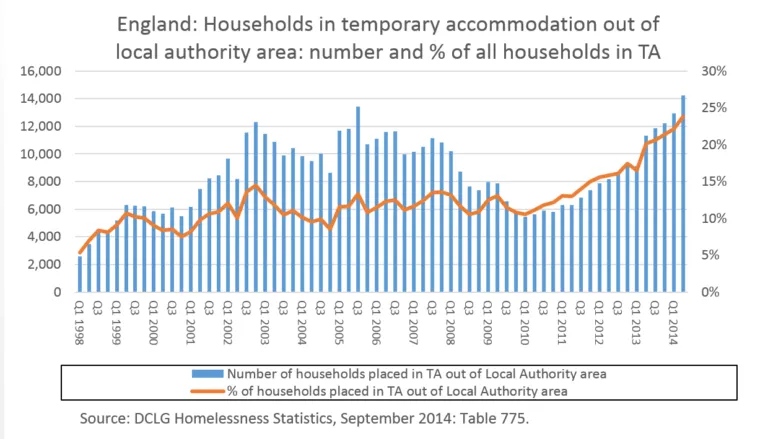The Christmas story of homeless children
Published: by Deborah Garvie
This week, children and parents all over the country are preparing for end-of-term plays and concerts and looking forward to the holidays with family and friends.
But England’s housing crisis means that for a growing number of families, going to watch your child in the school play isn’t the simple matter it once was. It likely involves a back-and-forth trek on expensive and convoluted public transport, or hanging around for hours after the school drop off to make sure you’re there to watch your child’s performance. It means standing in the cold waiting for buses, then watching your exhausted and hungry children fall asleep on the long ride back to a strange area where you know no one.
Today’s homelessness figures reveal that more homeless households than ever before are being accommodated by councils out of their home area. On 30 September 2014, 15,260 homeless households were in out-of-area temporary accommodation (TA) – a staggering rise of 123% in three years.
A total of 60,940 homeless households were living in TA, six per cent higher than at the same date in 2013, including 93,000 homeless children – even higher than the 90,000 we predicted.
Behind these statistics, are the stories of the people we work with. Stories like Jasmine, mum to 8 year old Poppy and 3 year old Darcy, who spent last Christmas in a B&B in Hertfordshire an hour’s drive from her children’s school. Most days she couldn’t afford to travel back home between dropping Poppy at school and Darcy at afternoon nursery ‘so we’d have to hang around until it was time for her to go to preschool. I was thinking if we get housed and it’s not in my area then I’d have to move the kids school. That would have broken my heart because Poppy is very established at her school’.
Stories like Alex, accommodated on the south coast, the 23 mile journey to 4 year old Emma’s school involving a long walk to the train station, two trains, then another walk: ‘We couldn’t do it. They were such long days. It was minimum two hours each way to take her to school, so she was having 12-13 hour days. One day she burst into tears because one of the girls invited her for afternoon tea and we just couldn’t do it because it took so long getting back home. It was so difficult for her’.
Young people like 16 year old Margaret, studying for four A levels, whose family were initially accommodated 30 miles away from their former home in Bedfordshire. She had to get up at 5:00am to get to school. Her mum, who’d worked all her life but was unable to raise the deposit and rent in advance on a new private letting told us: ‘She was in tears last night saying she’s got so much homework but it takes so long to get home from school. No visitors are allowed here which isn’t great for keeping in contact with her friends. We can’t invite them round’.
Stories like the E15 mothers, who – facing eviction from their hostel in East London and the prospect of having to live miles away – took matters into their own hands to campaign to stay living in their home area.
Too many areas are now unaffordable to ordinary working families, and particularly those who need to claim housing benefit to bridge the gap between wages and private rents. This is pushing people unable to compete in the overheated market to cheaper areas, often many miles from the support of family and friends, or having to ask for state assistance.
In inner London, where housing costs are now at unprecedented levels, the number of private renters claiming housing benefit dropped by over 10,000 claimants between August 2011 and August 2014, suggesting that finding a private rental affordable within benefit limits is increasingly difficult. In rural areas, where transport options are much more limited, children accommodated in another town can be just as badly affected as those travelling across a city.
We need an end to this by investing for our future in genuinely affordable homes in areas with transport, jobs and well-established communities. This should include an urgent review of whether housing benefit is providing an adequate safety net for families facing homelessness.
